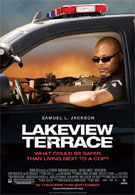Though he's the above-the-title star and probably the reason the movie was greenlit in the first place, Samuel L. Jackson-- in top, scenery-chewing form-- is probably the biggest liability in Lakeview Terrace. He hogs all the attention in his role as the irrational, racist cop Abel Turner, leaving no room for his amiable but bland co-stars, Patrick Wilson and Kerry Washington, to make an impact. Though the movie is intended as a battle of wills between good and bad, it becomes a playground in which Jackson runs amok, snarling and threatening and driving his movie into the ground.
Director Neil LaBute, who started in theater, is making a return to character-driven, stagy dramas like the ones that established his reputation as a credible filmmaker, and seems to be moving away from high-profile debacles like The Wicker Man. But Lakeview Terrace is oddly lacking in character as well, more of an anti-racism parable like Crash than an examination of any kind of real people. Though the set dressing captures the upper-middle-class neighborhood to a tee, the whole movie takes place a long, long way from the real world.
After opening credits set to portentous electronic music, the movie begins with Abel, spying on his new neighbors as they move into the gorgeous split-level next door. Initially assuming that Chris (Wilson) is the mover, Abel is unpleasantly surprised to find that the white Berkeley graduate is actually married to Lisa (Washington), a black woman who works at home doing graphic design of some sort. Though Abel works on the police beat with a Hispanic partner (Jay Rodriguez) and discourages his children away from hip-hop culture, something about the interracial relationship next door rubs him the wrong way.
At first his reign of terror is subtle. He leaves giant floodlights on at night, waking up Chris and Lisa, and spills the beans about Chris's secret smoking habit. But soon the couple finds their air conditioning unit tampered with, and their tires slashed. Constantly reminded that, as a cop, Abel is the law, Chris and Lisa feel helpless but stand their ground, trying to ignore Abel even as Lisa tries to befriend his teenage daughter and the other neighbors seem to see nothing wrong with it.
Abel could have developed as an interesting character had LaBute not tipped his hand so early, following each of his slightly-racist comments with thudding music that telegraphs "This is racist!" Chris, who lets Abel off easy in interest of being a good neighbor, comes off as an idiot instead, trusting Abel even when the directorial cues have made it clear he's dangerous. We also see Abel on the job, when he threatens the life of a black perp, making him seem less like a racist than an overall asshole.
As the movie progresses, Abel's character further falls apart. He hosts a bachelor party, full of strippers and rap music, when he's clearly discouraged his children away from both. He sics a stripper on Chris when he comes to ask them to quiet the music, and sends a video to Lisa, as if it wouldn't be obvious that Chris was protesting the whole time. And near the end of the movie, during an unlikely bar chat between Chris and Abel, he reveals the reason for his disdain for interracial relationships, a flimsy excuse that takes his character nowhere.
It all ends when encroaching wildfires serve as a deus ex machina that both strengthens Chris and Lisa's love and takes care of the Abel problem for good. Too bad the CGI flames in the distance are more compelling and realistic than anything we've actually seen onscreen.
Your Daily Blend of Entertainment News
Staff Writer at CinemaBlend


